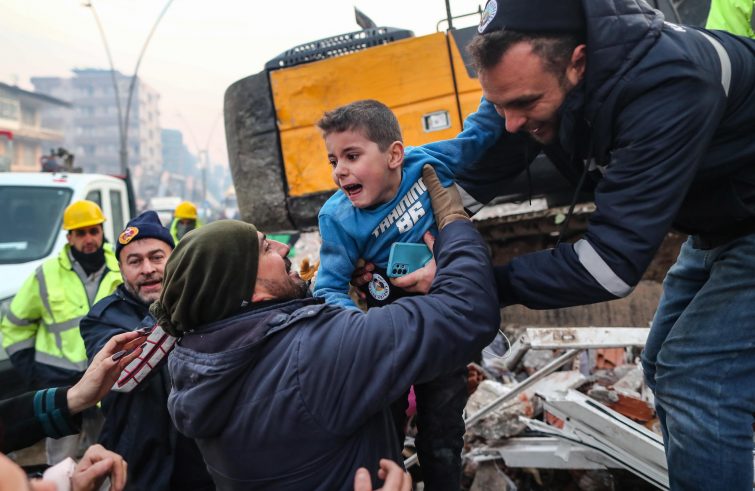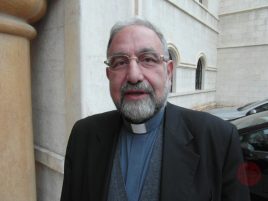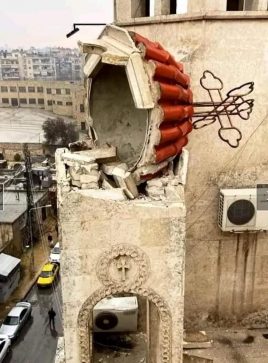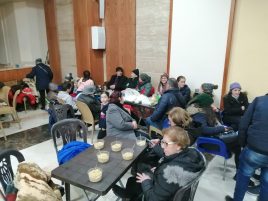
“Do not forget us, it’s my only appeal.” Monsignor Boutros Marayati, Archbishop of Aleppo of the Catholic Armenians in Syria, sent out his plea through SIR. Speaking from the second hardest hit Syrian city, along with Latakia, Hama and Tartous, controlled by President Assad’s regime, the prelate highlighted the needs of a land plagued by 12 years of war and now also by a devastating earthquake. Yet, he pointed out:
 “The Armenian-Catholic community in Aleppo did not report any particular damage to its facilities as occurred during the harshest periods of the war. Many of our faithful have lost their homes. We therefore arranged for teams of surveyors to inspect the damaged houses and determine which require full reconstruction and which can be repaired.” Just as all the churches in Aleppo, the Armenian church opened its doors to shelter earthquake victims who lost everything, not only their homes, but also their hope. “Restoring courage to these people is fundamental,” said the archbishop, who openly answered our questions, the same questions, he noted, that “I am asked by our faithful, and not only them.”
“The Armenian-Catholic community in Aleppo did not report any particular damage to its facilities as occurred during the harshest periods of the war. Many of our faithful have lost their homes. We therefore arranged for teams of surveyors to inspect the damaged houses and determine which require full reconstruction and which can be repaired.” Just as all the churches in Aleppo, the Armenian church opened its doors to shelter earthquake victims who lost everything, not only their homes, but also their hope. “Restoring courage to these people is fundamental,” said the archbishop, who openly answered our questions, the same questions, he noted, that “I am asked by our faithful, and not only them.”
Twelve years, almost thirteen years of war, followed by extreme poverty, the pandemic, now the earthquake. How does one make sense of it all?
I tried to make sense of all these unfolding tragedies, but I failed. All I know is that we must always do the will of God. We are Armenians, we are a martyred people, we suffered much harder times than this. This time we have to face a natural disaster, but we are the people of life and
we are not afraid of the challenges posed by the earthquake.
We can rise again. That is what we are telling the people we meet in the streets, in community centres, during Mass, wherever we are. We were not meant to stay underground, we were meant to be reborn, like Jesus, who rose from the dead and conquered death.
 The earthquake exacerbated the Syrian people’s tragic plight. It makes us wonder why God allows such tragedies. Why did God not stop the earthquake?
The earthquake exacerbated the Syrian people’s tragic plight. It makes us wonder why God allows such tragedies. Why did God not stop the earthquake?
This is the big question every human being wonders about, a question also found in Scripture. When faced with suffering, man invariably asks himself the reason for that suffering. Let us remember Job who suffers from no fault of his own, he loses everything—his children, his wealth, and eventually his health. It is the suffering of the righteous. It’s the tragedy of a man who feels weak and abandoned by God. But we know that it does not correspond to the truth: Job teaches us that in good times and in bad we must always remain faithful to Him.
The cause of our tragedies, in this case the earthquake, is not God but humankind that defies the laws of nature.
In a TV interview, an earthquake survivor from Antakya said that the cause of death is not the earthquake but concrete, man-made constructions..
When residential and office buildings and other structures are not built to the highest standards, there are consequences.
God is not responsible for the death and suffering of so many men, women and children. It’s man’s fault, with his corrupt and flawed behaviour.
Let us think of the war in Syria, which no one talks about any more. There too, human behaviour, vested interests and disregard for the common good are causing enormous suffering.
 How should we react, faced with this tragedy?
How should we react, faced with this tragedy?
With solidarity, by remaining united physically and spiritually knowing that the Lord will not abandon us. This is what we have been doing since the earthquake. As Churches we immediately opened our doors to everyone, assisting anyone in need. However, this is still the emergency stage. The greatest challenge, as I said before, will be restoring the damaged houses and rebuilding those that have collapsed. We do have a powerful enemy standing in our way….
Who is it?
Fear. People are sleeping in the streets, frightened and upset. Many of them sleep in their cars, in parish halls, in tents. They remain fully clothed because they want to be ready to flee whenever there is a tremor. There is widespread anxiety and people refuse to go back into their homes. Not even during the war have we experienced so much fear. We are looking for experts, doctors and psychologists to help people cope with this stress that we aren’t used to.
The Prefect of the Dicastery for the Eastern Churches, Msgr. Claudio Gugerotti, will be arriving in Syria today. After the visit of the Apostolic Nuncio, Card. Mario Zenari, another papal representative will be travelling to Aleppo to convey Pope Francis’ closeness…
Having the opportunity to welcome a representative of Pope Francis is extremely important for us. This closeness encourages us, it makes us feel that we are not alone, it touches people’s hearts and helps us overcome very hard times. I would also like to mention the active support of numerous Christian organisations and humanitarian agencies. Their help is vital for us. We have been feeling cut off from the rest of the world these past few years; no one cares about the war in Syria anymore. Sadly, it took a tragic earthquake to bring Syria into the news again.
Over the past few days, there have been numerous appeals calling for an easing of international sanctions on Syria. The US decided a six-month suspension of sanctions in order to ease the delivery of aid to the local population. Is this having a significant impact?
We have been asking to lift the sanctions for years. This is not a political problem, it’s a humanitarian issue. Here there are people dying for lack of aid, lack of medicine, the embargo is inhumane. We heard about the easing of sanctions by the US but, for the moment at least, we are struggling to see its positive impact.
On March 26, the Italian Church will promote a fund-raising initiative in parishes nationwide for the earthquake victims in Turkey and Syria.
The heartfelt support of the Italian Catholic Church is felt very strongly. The Italian Church has stood by our side all these years and is even closer to us today, after the earthquake. I would like to thank Card. Matteo Zuppi, president of the Italian Bishops’ Conference, for this closeness that brings hope to the sorely tried and frightened people of Syria. I have only one appeal to make: do not forget us.”












